Politics
Trump and Musk mocked in new AI video showing them as factory workers
Published
2 weeks agoon
By
Ekwutos Blog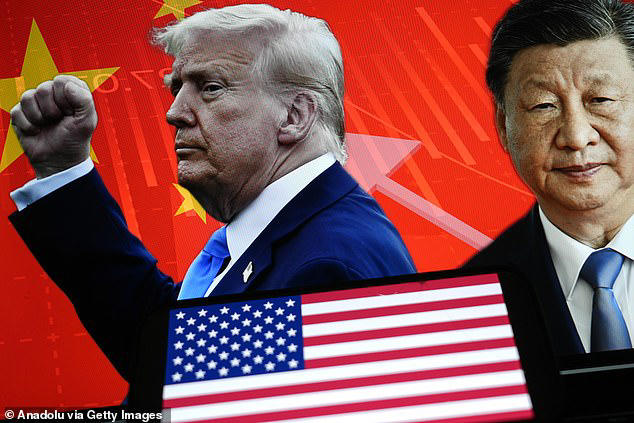
AI-Generated videos mocking Donald Trumpand his top team have continued to go viral amid a deepening trade war between the US and China.
New footage shows Trump, senior adviser Elon Musk and JD Vance working on a production line making trainers in a thinly veiled slight at the White House‘s hopes to bring back manufacturing to the US.
Chinese accounts have been promoting the video and photos ridiculing the so-called ‘US Manufacturing Revival Plan’ in light of the Chinese Communist Party vowing they would ‘fight to the end’ in a tariff war.
Despite a 90-day pause in implementing increased tariffs on other nations, Trump has continued to focus his fire on Beijing, further hiking the rate on Chinese imports to 125 per cent.
Should the economic stand-off continue, the Nike shoes featured in the video may skyrocket in price, according to experts.
At the moment, 62 per cent of the shoes sold in the United States are imported from China, with other nations like Vietnam, Indonesia, Cambodia and India providing the rest.
Just one per cent of shoes are produced domestically, with figures from the sneaker industry – worth $70billion annually – left frustrated.
Devlin Carter, the founder of luxury firm SIA collective – which manufactures shoes mostly in China – told NBC News: ‘These are ridiculous tariffs that make no sense.
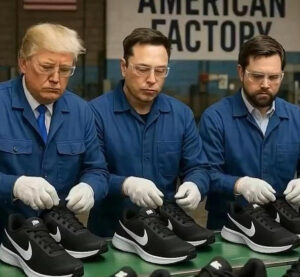
The footage shows Trump, senior adviser Elon Musk and JD Vance working on a production line
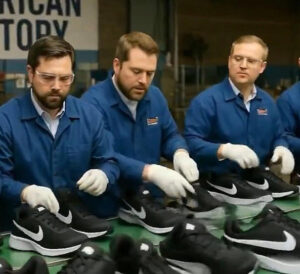
At the moment, 62 per cent of the shoes sold in the United States are imported from China
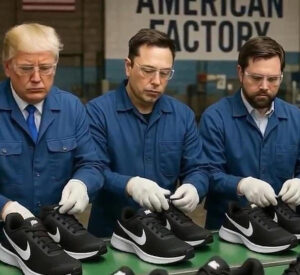
Just one per cent of shoes are produced domestically, with figures from the sneaker industry – worth $70billion annually – left frustrated
‘Small businesses like mine have to pay these tariffs, and it’s not a small thing. It’s a lot. So there’s no way to see this as something that’s good — for anybody.
‘And it’s all unnecessary.’
Economist Peter Schiff said last week: ‘Nike won’t build factories in the US to make sneakers. That would add more cost than the 40 per cent tariffs.
‘Plus, they need to stay competitive selling to customers in other countries that don’t impose tariffs. The result will be fewer sneakers sold in the US at much higher prices.’
Pepper Harward, chief executive officer of Oka Brands, which has a factory in the state of Georgia, told Footwear News: ‘The footwear ecosystem doesn’t really exist here.
‘Everybody’s interested in U.S. manufacturing but very few people are fully committed to it or have solid justifications for making investments there.
Chris Rogers, head of supply chain research at S&P Global Market Intelligence, said it could take a ‘couple of years’ at the minimum to move supply chains back to the US from abroad.

Economist Peter Schiff said last week: ‘Nike won’t build factories in the US to make sneakers. That would add more cost than the 40 per cent tariffs’
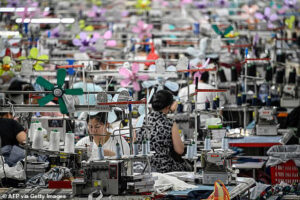
China is a key trading partner with a large manufacturing industry, producing inexpensive goods for American consumers
Other AI-generated videos related to the trade war have also been seen millions of times in both China and Western countries.
One popular one portrayed a glum picture of life in a re-industrialised America, with obese factory workers stitching cheap clothes.
China is a key trading partner with a large manufacturing industry, producing inexpensive goods for American consumers.
Trump’s tariffs come at a difficult time for China’s sluggish economy, with firms now scrambling to adjust their supply chains and officials concerned that any profits made selling goods to the US will be completely wiped out.
They have remained bullish in public, however, with China’s foreign ministry saying thery do not ‘fear’ further tariff threats.
‘The US cause doesn’t win the support of the people and will end in failure,’ a ministry spokesperson, Lin Jian, said at a press conference.
Beijing’s commerce ministry said: ‘We hope the US will meet China halfway, and, based on the principles of mutual respect, peaceful coexistence and win-win cooperation, properly resolve differences through dialogue and consultation.’
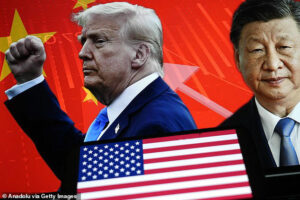
Trump’s tariffs come at a difficult time for China’s sluggish economy, with firms now scrambling to adjust their supply chains
But Trump is seemingly insistent on refusing to budge over his tariff strategy with Beijing.
‘At some point, hopefully in the near future, China will realise that the days of ripping off the USA and other countries is no longer sustainable or acceptable,’ he said.
China ‘wants to make a deal, they just don’t know how quite to go about it,’ he added.
‘They’re proud people. President Xi [Jinping] is a proud man. I know him very well. They don’t know quite how to go about it but they’ll figure it out.’
You may like


NAF airlifts Airforce students to their destinations across Nigeria
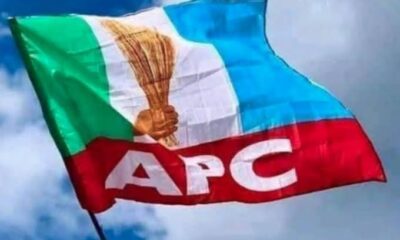

APC CANDIDATES FOR 2025 NIGER STATE LOCAL GOVERNMENT COUNCIL ELECTION
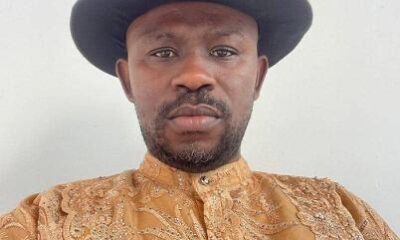

Kyari brought structure, stability to NNPCL – NDYC
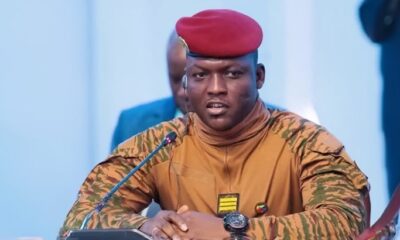

ANALYSIS: With Traore, Burkina Faso can get governance right, achieve developmental aspirations
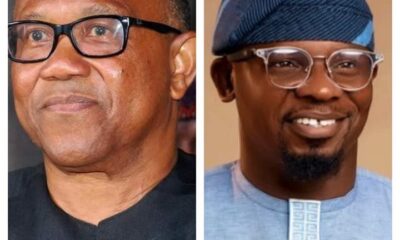

PETER OBI WILL WIN 2027 ELECTION EFFORTLESSLY—- Ife Salako(Labour party spokesperson Lagos state)
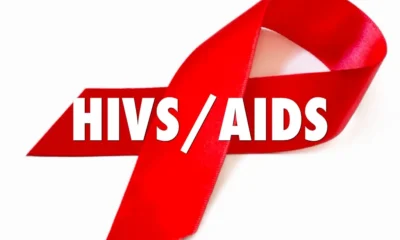

Ogun unveils new strategy to fight HIV/AIDS
Politics
APC CANDIDATES FOR 2025 NIGER STATE LOCAL GOVERNMENT COUNCIL ELECTION
Published
3 hours agoon
April 24, 2025By
Ekwutos Blog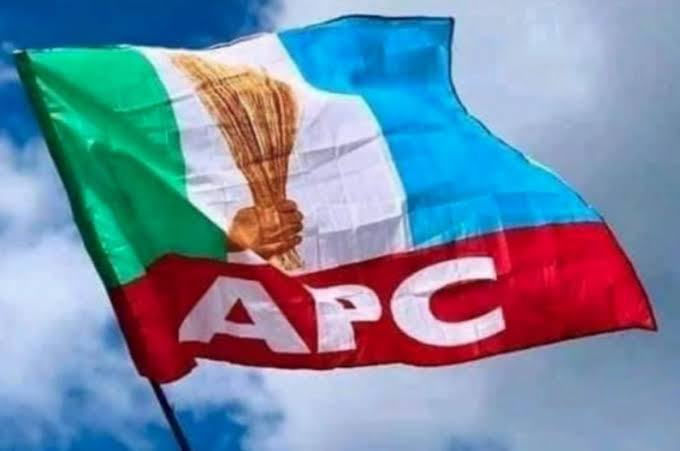
1. Hon. Sayuti Ibrahim Halilu – Again
2. Hon. Iliyasu Zakari – Agwara
3. Hon. Usman Manko Mohammed – Bida
4. Hon. Abdullahi Mohammed Nasiru – Borgu
5. Hon. Abdullahi Usman Laka – Bosso
6. Hon Mustapha Mohammed Jibril – Chanchaga
7. Hon. Usman Ndana – Edati
8. Hon. Hassan Mohammed – Gbako
9. Hon. Jonah Ishaya – GURARA
10. Hon. Isah Baba Bida – Katcha
11. Hon. Lawal Yusuf – Kontagora
12. Hon. Abdullahi Umar Evuti – Lapai
13. Hon. Mohammed Alfa Ma’ali – Lavun
14. Hon. Mamuda Mamman – Magama
15. Hon Aliyu Baga Mohammed – Mariga
16. Hon. Umar Jibril Igade – Mashegu
17. Hon. Jibril Abdullahi Muregi – Mokwa
18. Hon. Aminu A. Najume – Munya
19. Hon. Aminu Umar Yandayi – Paikoro
20. Hon. Ayuba Usman Katako – Rafi
21. Hon Abdullahi Yakubu Dukku – Rijau
22. Hon. Isyaku Bawa – Shiroro
23. Hon Isyaku Bawa Naibi – Suleja
24. Hon. Danladi T. Ijah – Tafa
25. Hon Mohammed Ibrahim Lokogoma – Wushishi
Politics
ANALYSIS: With Traore, Burkina Faso can get governance right, achieve developmental aspirations
Published
3 hours agoon
April 24, 2025By
Ekwutos Blog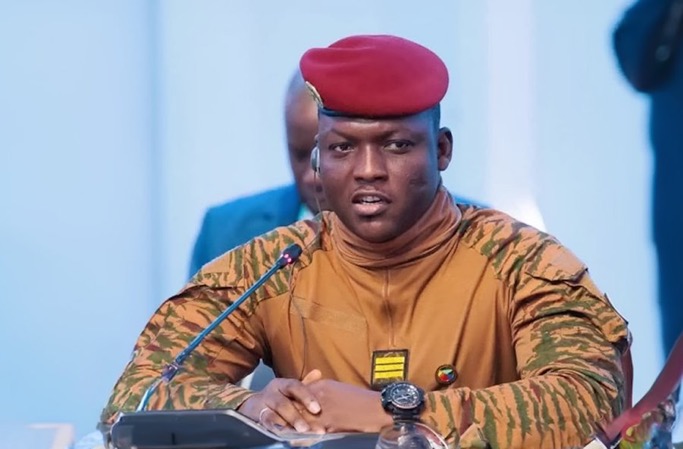
The challenge will be translating Burkina Faso’s rich mineral resources and promising economy into stability and development.
At 36, Burkina Faso’s Ibrahim Traoré is the world’s youngest president, in stark contrast to Africa’s average leader age of 63. He took office in September 2022 after overthrowing Paul-Henri Damiba, who had ousted former president Roch Kaboré earlier that year.
The foundations of the country’s coup administration have been rocky. Last week, the military government survived another apparent coup attempt; one among several since Mr Traoré, an army captain, came to power.
In his inaugural statement, Mr Traoré said Burkina Faso faced an emergency, citing crises in security, defence, healthcare, social action and infrastructure. He pledged to combat terrorism and adhere to the transition timetable agreed with the Economic Community of West African States (ECOWAS), which aimed to restore democratic rule by 1 July 2024.
However, Burkina Faso has since withdrawn from ECOWAS, forming instead the Alliance of Sahel States with Mali and Niger – countries also run by post-coup administrations. Under Burkina Faso’s new transition plan, Mr Traoré may remain in his position until at least 2029.
His popularity has soared since his ascension to power. At President John Mahama’s inauguration in Ghana on 7 January, Mr Traoré received the loudest applause of all 21 African heads of state. This showed not only his popularity but the trend of tolerance for military rule in Africa, especially among the youth.
Afrobarometer reports that almost two-thirds of Burkinabé believe the army should intervene when leaders abuse their power. Likewise, 66 per cent accept military rule, up from 24 per cent in 2012. The fact that the survey was conducted at a time when the country was under military rule portrays a general acceptance of the regime.
However, Mr Traoré’s popularity goes beyond acceptance of military rule. He has embarked on radical reforms that resonate with many Burkinabé. These include reversing his predecessor’s salary increase for government officials while he remainson his military captain earnings.
As part of efforts to take ownership of mineral resources, Mr Traoré has nationalised two gold mines and stopped exporting unrefined gold to Europe, instead inaugurating a national gold refinery expected to process 150 tonnes annually.
Other significant achievements include establishing the National Support Center for Artisanal Cotton Processing, building a new airport, and considerable agricultural investment.
While these are noble attempts to industrialise Burkina Faso, the country must not fall into the usual traps of inefficiencies, corruption and mismanagement that characterise most African state-owned enterprises.
Further, Mr Traoré has rejected financial assistance from the International Monetary Fund and World Bank, insisting the country can develop without the West’s loans and conditionalities. For some, this is a demonstration of Africans handling their own affairs. For the youth, Mr Traoré’s regime is a chance to show what young people can achieve. But for most ordinary Burkinabé, the priority is simply improving their daily living conditions.
At a time of increasing global uncertainty and a decline in international aid, Africa must strive for self-reliance and control of its resources. Like many African countries, Burkina Faso is blessed with natural resources that, if properly managed, could transform citizens’ lives.
The country has mineral resources and produces substantial quantities of gold, zinc, copper, manganese, phosphate and limestone. It also has reserves of diamonds, bauxite, nickel and vanadium, most of which remain largely unexploited.
The country has made gains. Gross Domestic Product (GDP) (in market exchange rate) increased from $3.2 billion in 1990 to $18.3 billion in 2023, and extreme poverty declined from 83 per cent to 27.7 per cent in the same period. But significant challenges remain.
According to the 2023/2024 Human Development Report, Burkina Faso is classified as having low human development and is ranked 185th out of 193 countries on the Human Development Index. Itplaced 149th out of 167 countries on the 2024 Sustainable Development Goals Index, and on the Multidimensional Poverty Index, 64.5 per cent of the population is multidimensionally poor.
However, the economy holds significant promise. Recent research by the Institute for Security Studies’ African Futures and Innovation team shows that Burkina Faso’s economy could grow at an average rate of 8 per cent from 2025 to 2043.
This would translate into an additional GDP per capita of $1,120 above a business-as-usual forecast – and reduce income poverty to only 2.6 per cent of the population. This means an extra 2.4 million Burkinabés could be lifted out of poverty by 2043.
The study identified governance reforms as critical to unlocking the country’s development potential. Indeed, good governance could raise GDP per capita by an extra $240 above a business-as-usual forecast, lifting 500,000 additional Burkinabé out of extreme poverty.
For this, Mr Traoré must lead the country in overcoming political instability, violent extremism and weak institutions. Institutional and structural reforms are needed to enhance security, accountability, public sector efficiency and governance inclusion.
The immediate priority is addressing terrorism, which resulted in the loss of about 40 per cent of the country’s territory, undermining the state’s authority and ability to deliver public services, as thousands of schools and health facilities are closed in those areas. The UN Refugee Agency estimates that over two million people are internally displaced, and those needing humanitarian assistance increased by 35 per cent between 2022 and 2023.
Next should be building strong institutions and strengthening existing ones to improve public sector efficiency and combat corruption. Local governments must be empowered with the resources and capacity to implement development programmes tailored to communities’ needs.
In the medium term, the country must transition into constitutional rule to ensure the political stability and legitimacy needed to drive economic growth. This would also enhance investor confidence, allowing Burkina Faso to attract the foreign direct investment needed for its development. The African Union, civil society organisations and development partners should support the 60-month transition plan to ensure a smooth transition to democracy.
This is not the first time such a charismatic figure has emerged on Africa’s political scene. Many revolutionary leaders started the same way but later deviated from the course as they clung to power. In Ghana, 32-year-old Jerry Rawlings, nicknamed ‘Junior Jesus’, emerged in late 1979 in a bloody revolution to fight corruption and sanitise the country’s political system. But after 19 years in power, his legacy was mixed.
With a young, strong, charismatic leader, Burkina Faso has a chance to get its governance right and achieve its developmental aspirations. This could be a lasting legacy for Traoré’s regime.
Enoch Randy Aikins, Researcher, African Futures and Innovation, Institute for Security Studies (ISS)
(This article was first published by ISS Today, a Premium Times syndication partner. We have their permission to republish).
Politics
PETER OBI WILL WIN 2027 ELECTION EFFORTLESSLY—- Ife Salako(Labour party spokesperson Lagos state)
Published
3 hours agoon
April 24, 2025By
Ekwutos Blog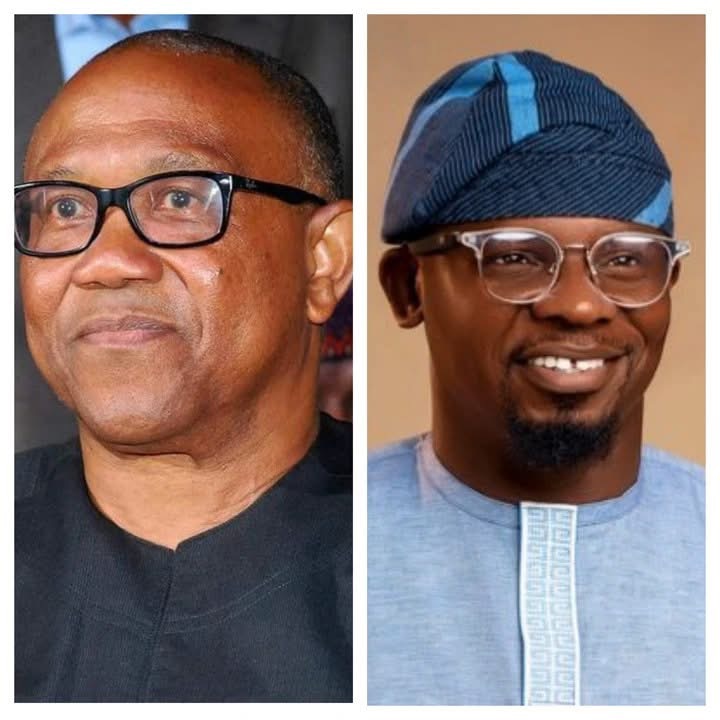
the labour party spokesperson, Lagos state chapter, Mr Ife Salako has affirmed that Peter Obi may not need the help of any governor to win the 2027 general election. Speaking about the recent decamp of some PDP politicians to APC, include that of the incumbent and former Governor of Delta state, the labour party spokesman is of the opinion that these defections have no negative effects on Peter Obi and his chances of becoming the next President of Nigeria.
In his tweet on X, he noted that:
“Okowa and all PDP Governors can defect to APC for all I care,” he wrote. “Let me just remind you all that Peter Obi had not one Governor with him in 2023 and he secured 6 million votes out of all the votes he got.”
“Now, he has 6 million soldiers to defend his votes. PETER OBI WILL WIN 2027 ELECTION EFFORTLESSLY!”

NAF airlifts Airforce students to their destinations across Nigeria

APC CANDIDATES FOR 2025 NIGER STATE LOCAL GOVERNMENT COUNCIL ELECTION

Kyari brought structure, stability to NNPCL – NDYC
Trending

 Trending6 months ago
Trending6 months agoNYA demands release of ‘abducted’ Imo chairman, preaches good governance
- Business6 months ago
US court acquits Air Peace boss, slams Mayfield $4000 fine

 Politics6 months ago
Politics6 months agoMexico’s new president causes concern just weeks before the US elections
- Entertainment6 months ago
Bobrisky transferred from Immigration to FCID, spends night behind bars
- Entertainment6 months ago
Bobrisky falls ill in police custody, rushed to hospital

 Politics6 months ago
Politics6 months agoRussia bans imports of agro-products from Kazakhstan after refusal to join BRICS

 Politics6 months ago
Politics6 months agoPutin invites 20 world leaders
- Politics1 year ago
Nigerian Senate passes Bill seeking the establishment of the South East Development Commission.

